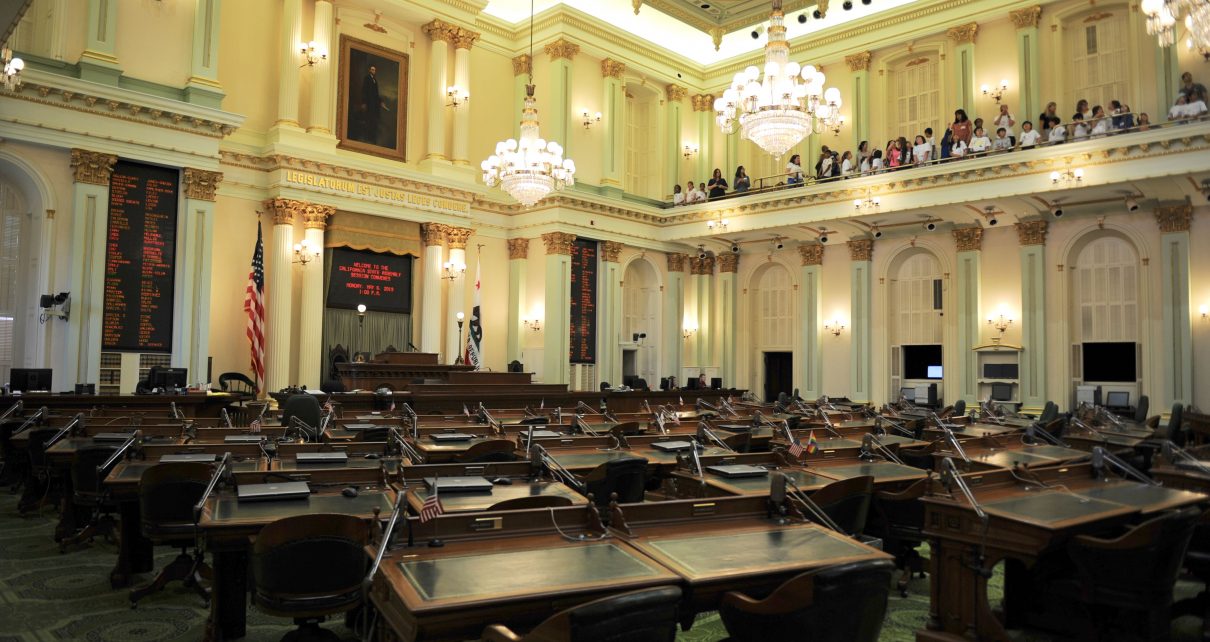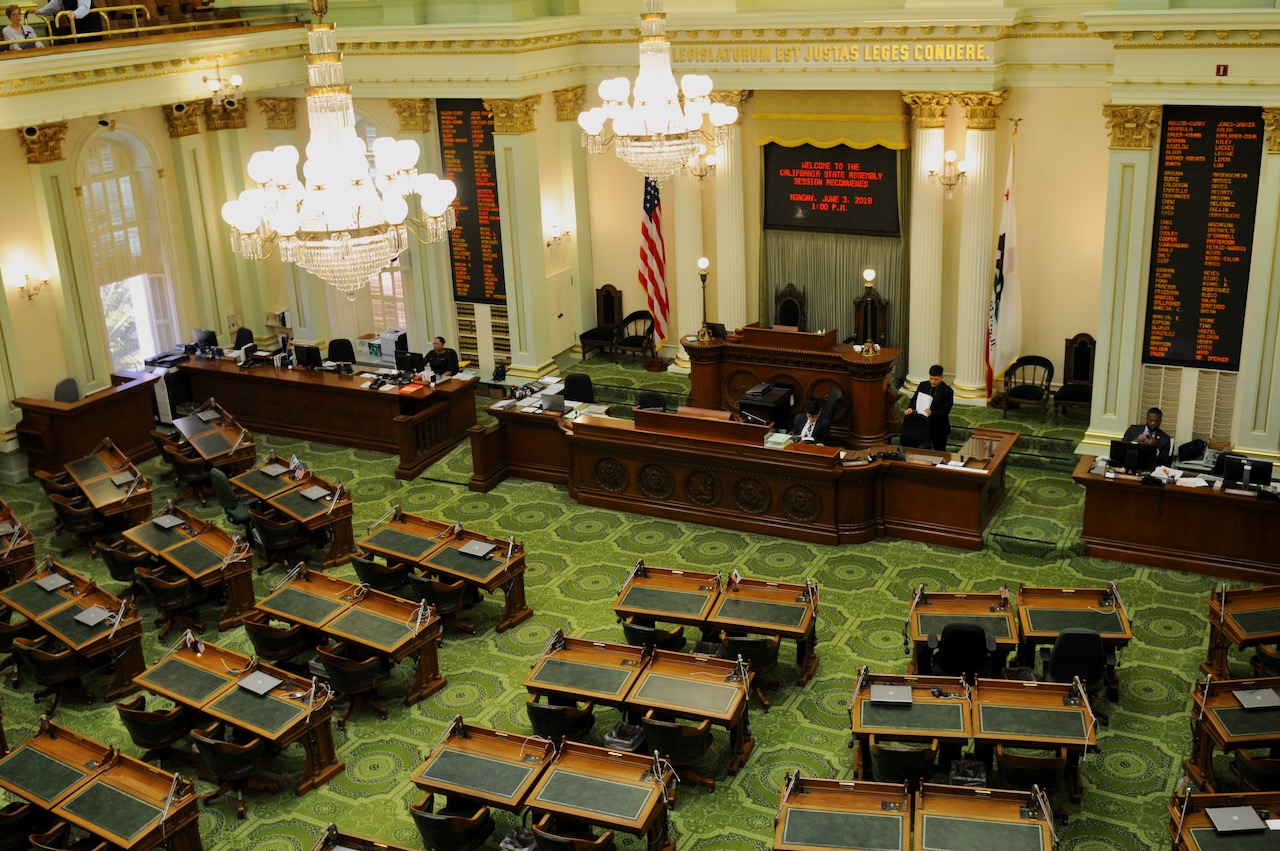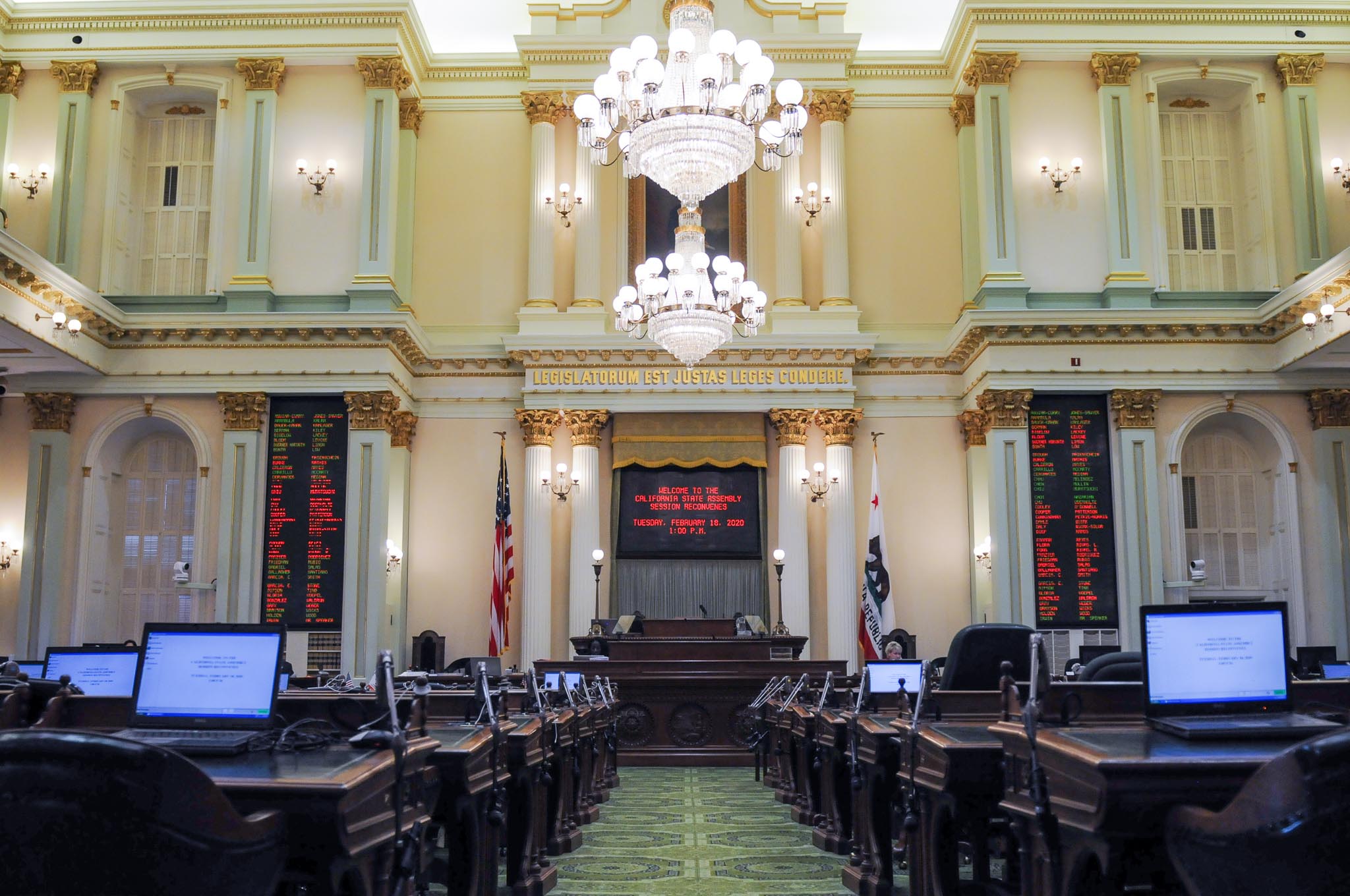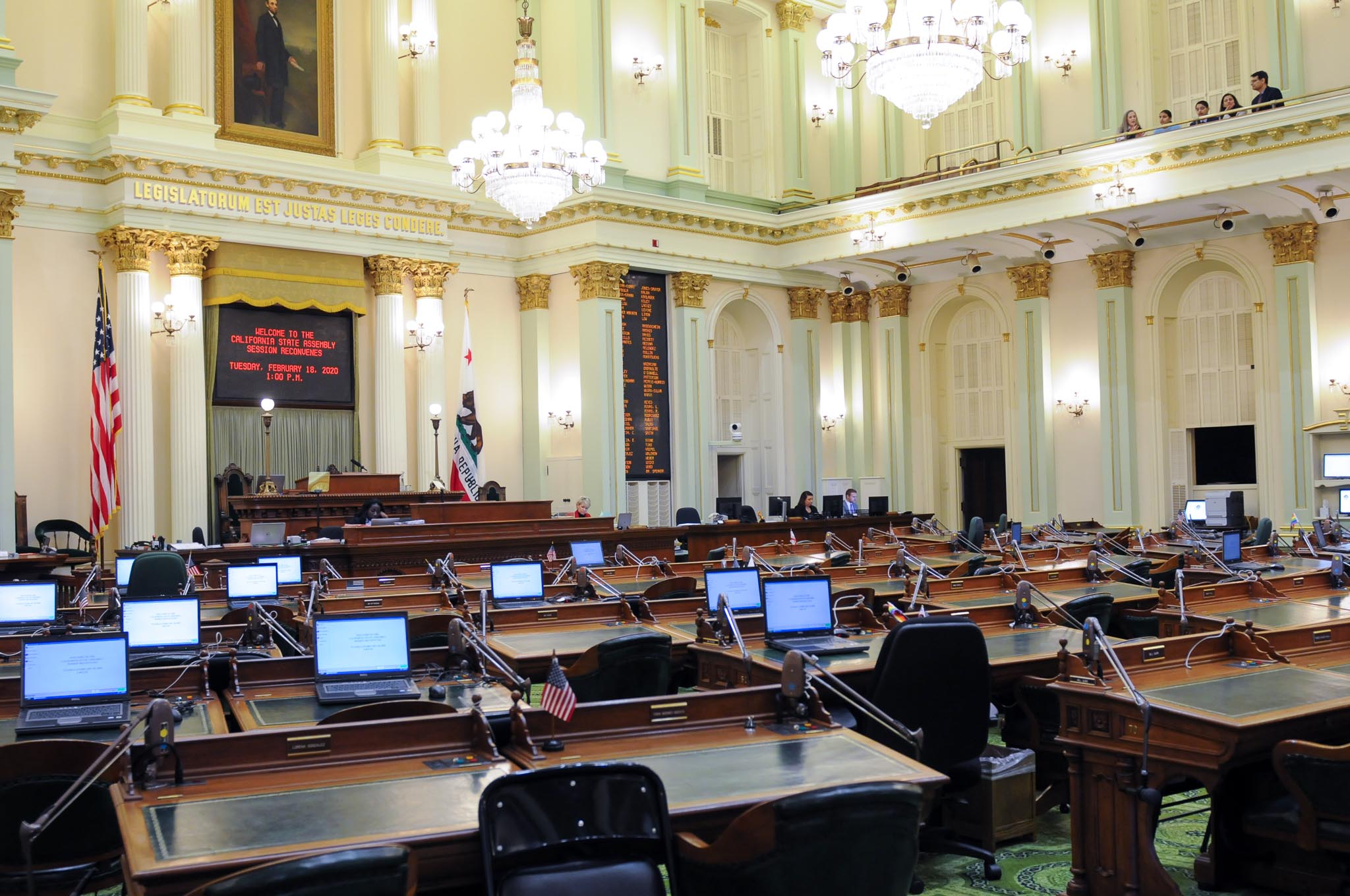
California Assembly Chambers. (Photo: Kevin Sanders for California Globe)
Key Provisions of the Legislature’s Internal Rules – The Assembly Rules – Part IV
The ayes and noes are recorded by the electronic voting system for all measures
By Chris Micheli, April 7, 2020 6:16 am
This is Part lV of Key Provisions of the Legislature’s Internal Rules – The Assembly Rules. Part l is here. Part ll is here. Part lll is here.
The previous question is put forth only when demanded by five Members and when sustained by a majority of those Members who are present and voting. It puts to an end all debate and requires a vote. (Rule 87)
A motion to set any matter before the Assembly as a special order of business is adopted by 54 votes. The motion is debatable only as to the propriety of setting the special order. (Rule 88)
A motion to postpone to a time certain is treated as a motion to set as a special order. (Rule 89)
The making of a motion to postpone indefinitely any measure or amendment opens the main question to debate. It requires 41 affirmative votes. (Rule 90)
A motion to amend may itself be amended. A motion to substitute is deemed a motion to amend. Any motion to amend is adopted by a majority of those present and voting. (Rule 91)
An amendment to any bill, other than a bill stating legislative intent to make statutory changes to implement the Budget Bill, is not in order when the amendment relates to a different subject or requires a title essentially different than the original bill. A motion or proposition on a subject different from that under consideration may not be admitted as an amendment. An amendment cannot change the original number of any bill. A Member cannot be added or deleted as an author or coauthor without his or her consent. (Rule 92)
A written or oral motion may not be adopted until it has been seconded and distinctly stated. (Rule 93)
Upon request of the Speaker, all motions must be in writing and read to the Assembly by the Speaker before being acted on. (Rule 94)
After a motion is stated, or a measure read by the Clerk, it is in the possession of the Assembly. (Rule 95)
A motion to withdraw a bill from committee or re-refer it to another committee may be made during the regular order of business. Such a motion may be debated and requires 41 votes to pass. A motion to withdraw a measure from committee may only occur after it has been approved by a majority vote of the Rules Committee. This does not apply to a bill in the Appropriations Committee that has been amended so that it is no longer fiscal. (Rule 96)
A motion to re-refer a measure on file to committee may be made during the regular order of business. The motion is debatable and requires 41 votes. (Rule 97)
A motion to strike a bill from the File requires 41 votes. Then the bill cannot be acted upon again during the session. (Rule 98)
Any action may be rescinded and its record expunged so long as it is done before the Journal has been approved. (Rule 99)
A motion to reconsider a vote on the next legislative day must be made on the same day the vote to be reconsidered was taken. It requires a second and 41 votes to pass. It takes precedence over all motions, except to adjourn. Motions to reconsider are not in order on the last two legislative days preceding the interim recess. A motion to reconsider can be taken up the same legislative day by another Member with 41 votes of the Assembly. (Rule 100)
Any Member may move a call of the Assembly prior to the announcement of the vote. It can be ordered by a majority of those present and voting. The Speaker will order the Sergeant at Arms to lock the doors and bringing the absent members. A recess or adjournment may not be taken during a call of the Assembly. A call can be dispensed with by a majority vote of those present and voting. (Rule 101)
Any Member may call for a division of the question and the Speaker orders the question divided. The rule does not apply to an individual measure. (Rule 102)
Every Member shall record his or her vote openly and without debate, unless the Assembly excuses the Member by a majority vote of those Members present and voting. A Member may not operate the voting switch of any other Member, except for the presiding Member. A Member may submit a written explanation for the Journal of less than 51 words in length why he or she chose not to vote. Public censure can occur for those who refuse to cast a vote. A Member may add his or her vote to any previously announced vote that has been taken so long as the outcome is not changed. This must occur prior to adjournment on the same legislative day and without objection from any other Member. The Chief Clerk handles all such requests. (Rule 104)
The ayes and noes are recorded by the electronic voting system for all measures. The names of the Members and how they voted are entered in the Journal. (Rule 105)
Voting cannot be interrupted, and any Member may move a call of the Assembly after completion of the roll. (Rule 106)
In the case of a tie vote, the measure fails passage. (Rule 107)
When a Member wants to address the Assembly, the Member rises from his or her seat and respectfully addresses the Speaker. Once recognized, he or she speaks to the question under consideration. The Speaker decides the order of Members. A Member shall not speak more than once during the debate, except that the author may speak at the open and close of debate. A maximum of five minutes is allotted to Members to speak. A Member may not yield any time to another Member. (Rule 108)
Members must conduct themselves in accordance with the rules of decorum per Mason’s Manual. The Rules Committee may adopt additional decorum rules by majority vote. (Rule 108.1)
When a Member desires to make a motion, the Member must first get recognized and then opens on the motion, but cannot speak to the merits of the motion, only to explain the motion. If the motion is in order and is seconded, then the motion can be debated. That Member cannot demand the previous question when concluding remarks. (Rule 109)
A Member may not be absent from any session of the Assembly without leave of the Assembly. 54 votes or unanimous consent are required for the absence to be excused. When on personal business, the Member waives per diem. When on legislative business, the Member must file with the Speaker a statement of the legislative business and it is printed in the Journal. If a Member is more than 30 minutes late to Session, he or she is required to stand before the Assembly and explain the reason that he or she is late. (Rule 110)
Any Member may rise to explain a matter of personal privilege, which is a matter involving the Member’s integrity, dignity or honor. Matters of personal privilege only yield to recess or adjournment motions. (Rule 111)
Any Member recognized may object to the reading of any paper before the Assembly. When that objection is made, the question is determined without debate by a majority of Members present and voting after the Speaker has made a brief statement. (Rule 112)
A Member or other persons are not allowed at the Chief Clerk’s Desk when votes are being recorded. (Rule 113)
If any Member violates the Assembly Rules, the Speaker or any Member may call the offending Member to order. The Member must take his or her seat and the Speaker makes a ruling, which is subject to an appeal to the Assembly. (Rule 114)
The Assembly may act as a Committee of the Whole at any time by majority vote of those Members present and voting. Non-Members may address the Assembly. The Speaker or a designee shall preside. (Rule 115)
The Assembly Chamber may not be used for any public or private business, other than legislative matters, except upon approval by the Speaker or the Chair of the Rules Committee. (Rule 116)
The smoking of tobacco products is prohibited within any building occupied or used by the Assembly and its employees, as well as within five feet of the building entrance or exit. (Rule 117)
While on the Assembly Floor during any session, or while serving on a committee during a hearing, Members cannot use a cell phone to make or receive calls, or to send or receive text messages from any lobbyist. (Rule 117.5)
A person, other than a peace officer, may not carry or possess a firearm on the Assembly Floor or in a committee hearing. (Rule 117.7)
With specified exceptions, persons are prohibited from the Assembly Floor during any sessions. A guest of a Member may be admitted with a guest card signed by the Speaker. They must be seated in the seats and not be in the lobby of the Chamber. No persons may engage in influencing the passage or defeat of legislation in the Chamber, other than Members. A lobbyist may not be admitted to the Chamber while the Assembly is in session. (Rule 118)
Proper attire is required of Members, officers, employees, and the press for admission to the Assembly Floor. Rules Committee may adopt policies. (Rule 118.1)
41 votes are required to determine the qualifications and election of any Member. A motion to disqualify a Member is not in order at the convening of a legislative session until the Speaker has been elected. (Rule 119)
If a Member of the Assembly is convicted of a felony, his or her right to compensation is suspended and committee memberships are suspended. The Rules Committee notifies the Controller about payments. If the conviction is reversed, then the payments are repaid to the Member. (Rule 120)
The Seal of the Assembly may be used only by or on behalf of Members of the Assembly or when authorized by the Rules Committee. (Rule 121)
Any report required or requested to be submitted by a state or local agency to Members must be submitted electronically to the Chief Clerk. (Rule 122)
Chris Micheli is an attorney and registered lobbyist with the Sacramento governmental relations firm of Aprea & Micheli, Inc. He also serves as an Adjunct Professor at McGeorge School of Law.
- Legislative Policy on Bay Area Pilotage - July 26, 2025
- Small Craft Harbors and Waterways in California - July 25, 2025
- Disability of Parties in Civil Actions - July 24, 2025







